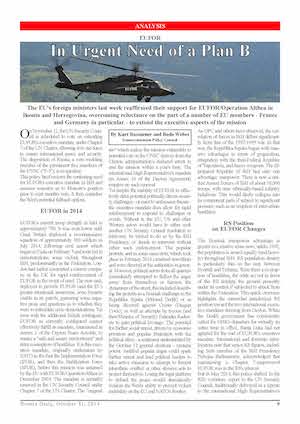
DPC BOSNIA DAILY: In Urgent Need of a Plan B
Bosnia Daily: October 31, 2014 – In Urgent Need of a Plan B
More...We kindly inform you that, as long as the subject affiliation of our 300.000+ articles is in progress, you might get unsufficient or no results on your third level or second level search. In this case, please broaden your search criteria.

Bosnia Daily: October 31, 2014 – In Urgent Need of a Plan B
More...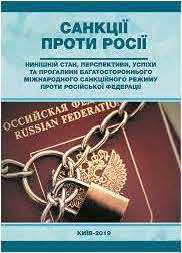
Economic, diplomatic and other sanctions have become a standard tool for international policy. The states that implement them use sanctions as an instrument of pressure to influence the geopolitical decisions of the government of the country against which they are directed. In 2014, in response to Russia's annexation of Crimea and the conflict in the east Ukraine, the United States, the EU, Canada, Australia and other countries have imposed sanctions againstthe aggressor. Russia has become the largest and most influential country against which such harsh sanctions have been imposed. Despite Russia's important position in the international arena, the US and the EU have stated that they will not lift sanctions regime until Russia’s implementation of the Minsk Agreements and the return of the Crimean peninsula.
More...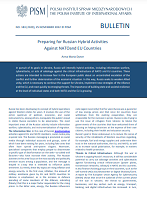
In pursuit of its goals in Ukraine, Russia will intensify hybrid activities, including information warfare, cyber-attacks, or acts of sabotage against the critical infrastructure of NATO and EU countries. These actions are intended to increase fear in the European public about an uncontrolled escalation of the conflict and further deterioration of the economic situation. In this way, Russia seeks to weaken Allied unity, which is necessary to continue the support for Ukraine, implement new strategies of the Alliance and the EU, and react quickly to emerging threats. The importance of building state and societal resilience at the level of individual states and both NATO and the EU is growing.
More...
The COVID-19 pandemic, the Russian aggression against Ukraine, and the resulting disruption of supply chains have intensified the ongoing debate in Germany over the preferred shape of German-Chinese relations. Chancellor Olaf Scholz’s government sees China as both a partner and rival. Reducing dependence on China is challenging due to its scale and the strength of the pro-China business lobby. This unsteady position will cause tensions in relations with partners, including the U.S., and conflicts within the governing coalition. Germany will continue to develop trade relations with China while blocking Chinese investment in critical sectors.
More...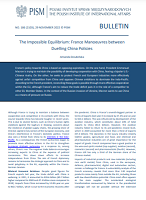
France’s policy towards China is based on opposing aspirations. On the one hand, President Emmanuel Macron is trying to maintain the possibility of developing cooperation with China, fearing a bipolar U.S.- Chinese rivalry. On the other, he seeks to protect French and European industries more effectively against unfair competition from China and opposes Chinese ambitions to dominate the Indo-Pacific. According to the French president, reconciling these goals is possible through more effective cooperation within the EU, although France’s aim to reduce the trade deficit puts it in the role of a competitor to other EU Member States. In the context of the Russian invasion of Ukraine, Macron wants to use China as a means of pressure on Russia.
More...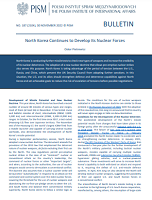
North Korea is conducting further missile tests to check new types of weapons and increase the credibility of its nuclear deterrence. The adoption of a new nuclear doctrine that allows pre-emptive nuclear strikes also serves this purpose. North Korea is taking advantage of the period of tension between the U.S., Russia, and China, which prevent the UN Security Council from adopting further sanctions. In this situation, the U.S. and its allies should strengthen defence and deterrence capabilities against North Korea and set achievable goals to reduce the risk of escalation of tensions before possible negotiations.
More...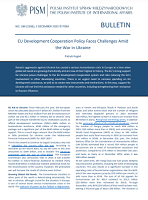
Russia’s aggression against Ukraine has caused a serious humanitarian crisis in Europe at a time when global aid needs are growing dramatically and are now at their highest in history. The EU’s strong support for Ukraine poses challenges to the EU development cooperation system and risks reducing the EU’s involvement in other developing countries. There is an urgent need to increase spending on EU development assistance, as well as to create new instruments and mechanisms. In this way, support for Ukraine will not limit the assistance needed for other countries, including strengthening their resistance to Russian influence.
More...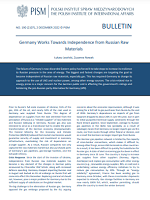
The failure of Germany’s now-discarded Eastern policy has forced it to take steps to increase its resilience to Russian pressure in the area of energy. The biggest and fastest changes are targeting the goal to become independent of Russian raw materials, especially gas. This has required Germany to change its approach to the use of LNG and nuclear power, among other energy sources. The crisis-related rise in energy prices is a major concern for the German public and is affecting the government’s ratings and bolstering the pro-Russian party Alternative for Germany (AfD).
More...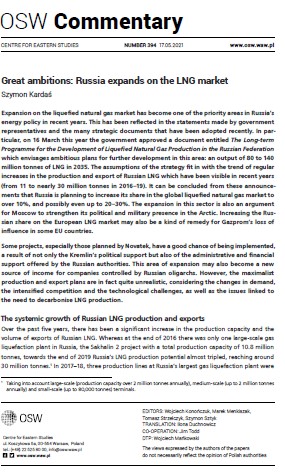
Expansion on the liquefied natural gas market has become one of the priority areas in Russia’s energy policy in recent years. This has been reflected in the statements made by government representatives and the many strategic documents that have been adopted recently. In particular, on 16 March this year the government approved a document entitled The Long-term Programme for the Development of Liquefied Natural Gas Production in the Russian Federation which envisages ambitious plans for further development in this area: an output of 80 to 140million tonnes of LNG in 2035. The assumptions of the strategy fit in with the trend of regular increases in the production and export of Russian LNG which have been visible in recent years (from 11 to nearly 30 million tonnes in 2016–19). It can be concluded from these announcements that Russia is planning to increase its share in the global liquefied natural gas market to over 10%, and possibly even up to 20–30%. The expansion in this sector is also an argument for Moscow to strengthen its political and military presence in the Arctic. Increasing the Russian share on the European LNG market may also be a kind of remedy for Gazprom’s loss of influence in some EU countries.
More...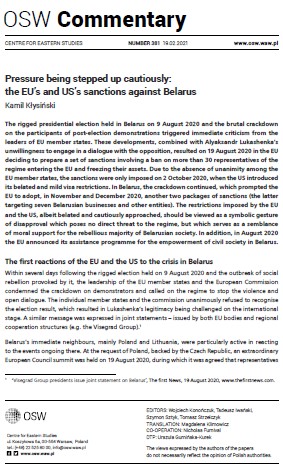
The rigged presidential election held in Belarus on 9 August 2020 and the brutal crackdown on the participants of post-election demonstrations triggered immediate criticism from the leaders of EU member states. These developments, combined with Alyaksandr Lukashenka’s unwillingness to engage in a dialogue with the opposition, resulted on 19 August 2020 in the EU deciding to prepare a set of sanctions involving a ban on more than 30 representatives of the regime entering the EU and freezing their assets. Due to the absence of unanimity among the EU member states, the sanctions were only imposed on 2 October 2020, when the US introduced its belated and mild visa restrictions. In Belarus, the crackdown continued, which prompted the EU to adopt, in November and December 2020, another two packages of sanctions (the latter targeting seven Belarusian businesses and other entities). The restrictions imposed by the EU and the US, albeit belated and cautiously approached, should be viewed as a symbolic gesture of disapproval which poses no direct threat to the regime, but which serves as a semblance of moral support for the rebellious majority of Belarusian society. In addition, in August 2020 the EU announced its assistance programme for the empowerment of civil society in Belarus.
More...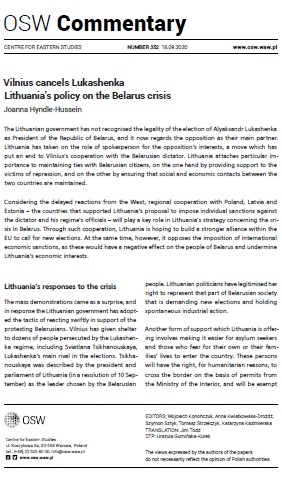
The Lithuanian government has not recognised the legality of the election of Alyaksandr Lukashenka as President of the Republic of Belarus, and it now regards the opposition as their main partner. Lithuania has taken on the role of spokesperson for the opposition’s interests, a move which has put an end to Vilnius’s cooperation with the Belarusian dictator. Lithuania attaches particular importance to maintaining ties with Belarusian citizens, on the one hand by providing support to the victims of repression, and on the other by ensuring that social and economic contacts between the two countries are maintained.
More...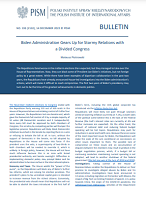
The Republicans fared worse in the midterm elections than expected, but they managed to take over the House of Representatives. Now, they can block some of President Joe Biden’s initiatives, but not foreign policy to a great extent. While there have been examples of bipartisan collaboration in the past two years, the Republicans have already announced House-led investigations into the Biden administration’s actions, which will make it difficult to reach compromise. The first two years of Biden’s presidency may turn out to be the time of his greatest achievements in domestic politics.
More...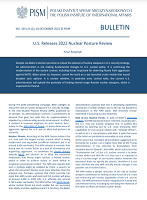
Despite Joe Biden’s election promise to reduce the salience of nuclear weapons in U.S. security strategy, his administration is not making fundamental changes to U.S. nuclear policy. It is continuing the modernisation of the nuclear arsenal, including forces important for deterring Russia from aggression against NATO. Biden wants to, however, cancel the work on a sea-launched cruise missile that would broaden such options. It is unclear whether, in potential arms control talks, the current U.S. administration will uphold the postulate of limiting shorter-range Russian nuclear weapons, which is important for Poland.
More...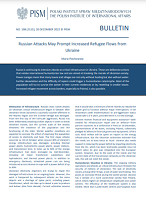
In December, EU interior ministers unanimously supported the expansion of the Schengen zone to include Croatia. At the same time, the Council did not agree on the membership of Romania and Bulgaria. The former was opposed by Austria, and the latter by both Austria and the Netherlands. Although Croatia’s smooth integration into Schengen may weaken the arguments of sceptics of further enlargement, without deep reforms of the entire system and the EU’s migration policy, it will be very difficult to obtain consent for membership of other candidates.
More...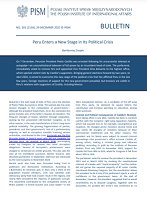
On 7 December, Peruvian President Pedro Castillo was arrested following his unsuccessful attempt at autogolpe - an unconstitutional takeover of full power by an incumbent head of state. The parliament, immediately voted to remove him and appointed Vice President Dina Boluarte to the highest office, which sparked violent riots by Castillo’s supporters. Bringing general elections forward by two years, to April 2024, is aimed to overcome this new stage of the political crisis that has afflicted Peru in the last few years. Foreign reactions of support for the new government prevailed, but tensions are visible in Peru’s relations with supporters of Castillo, including Mexico.
More...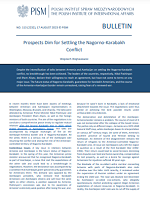
Despite the intensification of talks between Armenia and Azerbaijan on settling the Nagorno-Karabakh conflict, no breakthrough has been achieved. The leaders of the countries, respectively, Nikol Pashinyan and Ilham Aliyev, declare their willingness to reach an agreement, but have not come to terms on any major issue. The future status of Nagorno-Karabakh, guarantees for Karabakh Armenians, and the course of the Armenian-Azerbaijani border remain unresolved, raising fears of a renewed war.
More...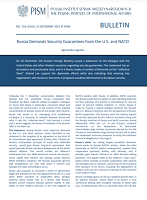
On 10 December, the Russian Foreign Ministry issued a statement on the dialogue with the United States and other Western countries regarding security guarantees. The statement has an accusatory and provocative tone, and in it Russia makes a number of demands on the “collective West”. Poland can support the diplomatic efforts while also indicating that entering into negotiations with Russia on the terms it proposes would be detrimental to European security.
More...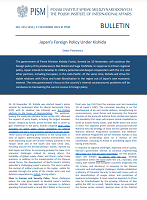
The government of Prime Minister Kishida Fumio, formed on 10 November, will continue the foreign policy of his predecessors Abe Shinzō and Suga Yoshihide. In response to China’s regional policy, Japan intends to develop its military potential and deepen cooperation with the U.S. and other partners, including European, in the Indo-Pacific. At the same time, Kishida will strive for stable relations with China and trade liberalisation in the region out of Japan’s own economic interest. The new government’s focus on the country’s internal socioeconomic problems will be conducive to maintaining the current course in foreign policy.
More...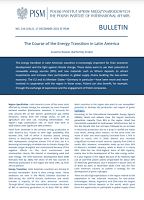
The energy transition in Latin American countries is increasingly important for their economic development and the fight against climate change. These states want to use their potential of renewable energy sources (RES) and raw materials such as lithium deposits to attract investments and increase their participation in global supply chains building the low-carbon economy. The EU and its Member States - Germany in particular - have been more and more involved in cooperation with the region in these areas. Poland can also benefit, for example, through the exchange of experience and the engagement of Polish companies.
More...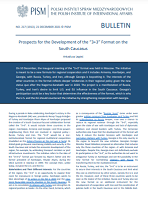
On 10 December, the inaugural meeting of the “3+3” format was held in Moscow. The initiative is meant to be a new formula for regional cooperation and it includes Armenia, Azerbaijan, and Georgia, with Russia, Turkey, and Iran, although Georgia is boycotting it. The interests of the other countries in the format reflects deeper tendencies in their regional policy given the new status quo after the Nagorno-Karabakh war in 2020. The project is a manifestation of Russia, Turkey, and Iran’s desire to limit U.S. and EU influence in the South Caucasus. Georgia’s participation could be a key factor that determines the effectiveness of the format, which is why the U.S. and the EU should counteract the initiative by strengthening cooperation with Georgia.
More...